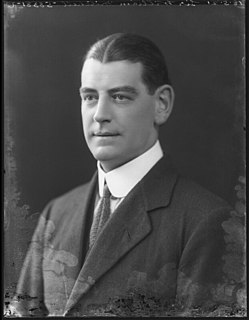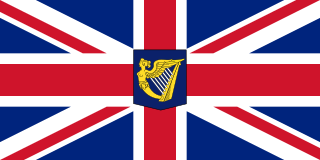Related Research Articles
The Scottish National Party is a Scottish nationalist and social democratic political party in Scotland. The SNP supports and campaigns for Scottish independence from the United Kingdom and for membership of the European Union, with a platform based on civic nationalism. The SNP is the largest political party in Scotland, where it has the most seats in the Scottish Parliament and 45 out of the 59 Scottish seats in the House of Commons at Westminster, and it is the third-largest political party by membership in the United Kingdom, behind the Labour Party and the Conservative Party. The current Scottish National Party leader, Nicola Sturgeon, has served as First Minister of Scotland since 20 November 2014.
The Liberal Unionist Party was a British political party that was formed in 1886 by a faction that broke away from the Liberal Party. Led by Lord Hartington and Joseph Chamberlain, the party established a political alliance with the Conservative Party in opposition to Irish Home Rule. The two parties formed the ten-year-long coalition Unionist Government 1895–1905 but kept separate political funds and their own party organisations until a complete merger between the Liberal Unionist and the Conservative parties was agreed to in May 1912.

Andrew Bonar Law was a British Conservative politician who served as Prime Minister of the United Kingdom from October 1922 to May 1923.
The National Party of Scotland (NPS) was a centre-left political party in Scotland which was one of the predecessors of the current Scottish National Party (SNP). The NPS was the first Scottish nationalist political party, and the first which campaigned for Scottish self-determination.

Siol nan Gaidheal is a minor Scottish ultranationalist and ethnic nationalist group which describes itself as a "cultural and fraternal organisation".

John MacDonald MacCormick was a Scottish lawyer, Scottish nationalist politician and advocate of Home Rule in Scotland.
The Scots National League (SNL) was a political organisation which campaigned for Scottish independence in the 1920s. It amalgamated with other Scottish nationalist bodies in 1928 to form the National Party of Scotland.

Colonel Walter Elliot Elliot was a British politician of Scotland's Unionist Party prominent in the interwar period. He was elected to the House of Commons of the United Kingdom in 1918, and besides an interval of months in 1923–24 and 1945-46, remained in parliament until his death. His Cabinet roles were as the Minister of Agriculture, Fisheries and Food in the National Government (1931–1935) of Ramsay MacDonald; as the Secretary of State for Scotland in the National Government (1935–1937) of Stanley Baldwin; and as Minister of Health in Neville Chamberlain's National Government (1937–1939) and the short-lived Chamberlain war ministry.

William Lowson Mitchell-Thomson, 1st Baron Selsdon, known as Sir William Mitchell-Thomson, 2nd Baronet, from 1918 to 1932, was a Scottish politician who served as British Postmaster-General from 1924 till 1929.

Ireland was part of the United Kingdom of Great Britain and Ireland from 1801 to 1922. For almost all of this period, the island was governed by the UK Parliament in London through its Dublin Castle administration in Ireland. Ireland underwent considerable difficulties in the 19th century, especially the Great Famine of the 1840s which started a population decline that continued for almost a century. The late 19th and early 20th centuries saw a vigorous campaign for Irish Home Rule. While legislation enabling Irish Home Rule was eventually passed, militant and armed opposition from Irish unionists, particularly in Ulster, opposed it. Proclamation was shelved for the duration following the outbreak of World War I. By 1918, however, moderate Irish nationalism had been eclipsed by militant republican separatism. In 1919, war broke out between republican separatists and British Government forces. Subsequent negotiations between Sinn Féin, the major Irish party, and the UK government led to the signing of the Anglo-Irish Treaty, which resulted in five-sixths of Ireland seceding from the United Kingdom.

The Irish Unionist Alliance (IUA), also known as the Irish Unionist Party, Irish Unionists or simply the Unionists, was a unionist political party founded in Ireland in 1891 from a merger of the Irish Conservative Party and the Irish Loyal and Patriotic Union to oppose plans for home rule for Ireland within the United Kingdom of Great Britain and Ireland. The party was led for much of its existence by Colonel Edward James Saunderson and later by William St John Brodrick, Earl of Midleton. In total, eighty-six members of the House of Lords affiliated themselves with the Irish Unionist Alliance, although its broader membership was relatively small.

Ulster nationalism is a minor school of thought in the politics of Northern Ireland that seeks the independence of Northern Ireland from the United Kingdom without joining the Republic of Ireland, thereby becoming an independent sovereign state separate from both.

Commodore James Graham, 6th Duke of Montrose was a Scottish nobleman, naval officer, politician and engineer. He took the first film of a solar eclipse and is credited as the inventor of the aircraft carrier.

Unionism in the United Kingdom, also referred to as British unionism, is a political ideology favouring the continued unity of England, Scotland, Wales and Northern Ireland as one sovereign state, the United Kingdom of Great Britain and Northern Ireland. Those who support the union are referred to as "Unionists". British unionism can be associated with British nationalism, which asserts that the British are a nation and promotes the cultural unity of the Britons, which may include people of English, Scottish, Welsh, Irish and Cornish descent.
Andrew Dewar Gibb MBE QC was a Scottish advocate, barrister, professor and politician. He taught law at Edinburgh and Cambridge, and was Regius Professor of Law at the University of Glasgow 1934–1958. Gibb was the leader of the Scottish National Party (SNP) from 1936 to 1940.

The Irish Home Rule movement was a movement that campaigned for self-government for Ireland within the United Kingdom of Great Britain and Ireland. It was the dominant political movement of Irish nationalism from 1870 to the end of World War I.
The Irish Dominion League was an Irish political party and movement in Britain and Ireland which advocated Dominion status for Ireland within the British Empire, and opposed partition of Ireland into separate southern and northern jurisdictions. It attracted modest support from middle-class Dubliners of moderate unionist and nationalist backgrounds, anxious to achieve a compromise in the face of the escalating conflict between the Irish Republican Army and the British. It operated between 1919 and 1921.
The South Lanarkshire by-election was a Parliamentary by-election. It returned one Member of Parliament (MP) to the House of Commons, elected by the first past the post voting system.
The Irish Centre Party was a short-lived federalist political party in Ireland which advocated establishing a federal structure for a self-governing Ireland within the British Empire. It was founded in 1919 by Stephen Gwynn and merged with the Irish Dominion League later that year.
John Kevan McDowall was a Scottish solicitor and politician during the early 20th century. He lived and practiced as a solicitor in Glasgow for the majority of his life. He was the first and only leader of the Scottish Party, which later merged with the National Party of Scotland (NPS) to form the Scottish National Party (SNP) in 1934.
References
- 1 2 3 Arnold Kemp (1993). The Hollow Drum: Scotland since the war. Mainstream. p. 50.
- 1 2 James Mitchell (2014). The Scottish Question. Oxford University Press. p. 93.
- ↑ "Scottish Nationalists to Unite". The Glasgow Herald . 1 February 1934. p. 8. Retrieved 25 April 2017.